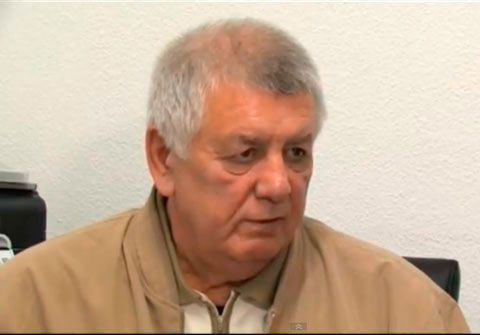Aleh Alkayeu: Execution is murder
-

- Aleh Alkayeu
What does the executioner feel? Aleh Alkayeu, former chief of prison No. 1 in Minsk in 1996-2001, who was involved in 134 executions, tells the activists of the campaign “Human Rights Defenders against the Death Penalty in Belarus” about this.
Aleh Alkayeu argues that the stress associated with the execution of a death penalty “can be compared to nothing”. None of the executioners can imagine the effect of the first execution on his mental state. The first time provokes the “time dilation effect” and other signs of post-traumatic stress syndrome.
This interview with Aleh Alkayeu was recorded in the preparation of the film “Departed on Sentence”.
- I can tell you that during my exile one executioner died of a heart attack at a fairly young age, he did not live to be 50. Murder is always murder, even if it is done by law. And the squad leaders... There are some who live, and others who die at a young age. Maybe it is because of stress, maybe there are other circumstances. Of course, the executioner is experiencing certain emotions. I felt them. Stress. There simply was no psychiatrist or doctor around who could measure the degree of stress... All your interests are broken against the prison door – no one there will tell you anything and will show nothing. Execution of a sentence is a murder, a terrible burden that falls on those who do it. Killing a person who has not hurt you personally, killing without malice, without passions – it’s hard. Execution does not fit into normal life. No way. Absolutely. It is like nothing.
- Can you describe the emotional state during the execution of a death sentence for the first time?
- The emotional state for the first time is the same for everyone. First, it is the delayed perception of time. I talked about it with the staff. Time slows down... You clearly see all parts of the gun and as the bullet flies, in slow motion... I asked others, they experienced the same thing. And then everything is OK... And the gun too... Employees who were on the squad were not allowed anywhere near during the first time – they all watched from a distance. The reaction is unpredictable. You may lose consciousness, who knows what you are like. At first, he watched from a distance, and next time he came up. I will not tell in detail how different people perceive this, what for? Nobody lost consciousness, of course. This is work, anyway. Naturally, there is stress. And I do not deny it. This is murder and murder should be punished. At war, a man shoots from a distance, and he does not know if he missed or not. And he gets shot too. This is different.
As for the degree of guilt... Do you think that whoever presses the trigger feels guiltier than the others? No, this guilt is distributed among all. One holds, the other presses the trigger. Therefore the one who shoots and the one who holds are not specifically selected. Therefore the group was classified, and therefore close relatives did not know, even the colleagues did not know who was doing what. And it was carried out primarily by members of the squad.
- And what about the state of the convict on death row?
- Convicts... They can feel everything. At what level? Subconsciously, of course, but they can feel it. They catch all the noises. Even heels creaking, they know who came and why. They could tell the librarian from the warden, and the warden from the chief warden. The convict knows the number of steps, how many people have come and why. If the number of steps exceeds the standard, they already know that they came not to give them books. And I have been an opponent of the process of execution itself for a long time already. Because it is not quite civilized. This procedure is depressing for all. Generally, my opinion was as follows... I thought that the offender should not even know that he was sentenced to death. And then... There are many ways to die quietly, with a feeling that one is asleep.
- Why are not the relatives of the executed person told about the execution of the death penalty, but reported that he “departed on sentence”?
- The cards of the individuals who have been executed have only three words, “departed on sentence”. And nobody has the right to write anything else. Nobody has the right to interpret these words. Even me. We did not have to decipher this phrase. Moreover, because this was not my phrase, it survived from the USSR Ministry of Internal Affairs, NKVD, and they used to write “10 years of incommunicado”. Then they came up with this phrase, and it is still in effect, it has not been canceled. And no one will explain where he “departed on sentence”, why and how.
- How do you now feel about this form of punishment as the death penalty?
- Today I live in a country where there is no death penalty. And there are no corpses lying in the streets. No one is killed, it is very rare. There is no death penalty in France, where the guillotine put into a museum only in 1980, and it used to work before that. In Russia, they found the strength to abandon the death penalty, in Ukraine, in all the CIS countries. Belarus is the only one left... So I am against the death penalty. Once these countries exist, and there is no burst of serious crimes, it probably is the best proof that the country can exist without the death penalty. Today I live in such a country.

